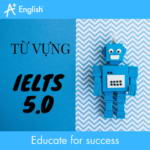Cùng A+ English khám phá danh sách từ vựng IELTS 5.0 để chuẩn bị cho kì thi sắp tới các bạn nhé!
DANH SÁCH TỪ VỰNG
| New Vocabulary | Meaning in English | Meaning in Vietnamese ( Student’s homework ) |
| suggest (v) | put forward for consideration | |
| value: (n) | the regard that something is held to deserve; the importance, worth, | |
| possession: (n) | the state of having, owning, or controlling something. | |
| research : (v) | discover facts by investigation for use in (a book, program, etc.). | |
| unfortunate:(adj) | having or marked by bad fortune; unlucky. | |
| definition : (n) | a statement of the exact meaning of a word, especially in a dictionary. | |
| temporary:(adj) | lasting for only a limited period of time; not permanent. | |
| view: (n) | the ability to see something or to be seen from a particular place. | |
| alternatively (adv): | as another option or possibility | |
| guideline:(n) | a general rule, principle, or piece of advice. | |
| mention (v) | refer to something briefly and without going into detail. | |
| unfortunate : (adj) | having or marked by bad fortune; unlucky. | |
| similar (adj) | resembling without being identical. | |
| definition (n) | a statement of the exact meaning of a word, especially in a dictionary. | |
| embarrass:(v) | cause (someone) to feel awkward, self-conscious, or ashamed. | |
| curious :(adj) | eager to know or learn something. | |
| delighted: (adj) | feeling or showing great pleasure. | |
| miserable :(adj) | (of a person) wretchedly unhappy or uncomfortable. | |
| disappointed:(adj) | (of a person) sad or displeased because someone or something has failed to fulfill one’s hopes or expectations. | |
| ashamed:(adj) | embarrassed or guilty because of one’s actions, characteristics, or associations. | |
| guilty:(n) | culpable of or responsible for a specified wrongdoing. | |
| symptoms: (n) | a physical or mental feature which is regarded as indicating a condition of disease, particularly such a feature that is apparent to the patient. | |
| survey (n) : | a general view, examination, or description of someone or something. | |
| arthritis :(n) | painful inflammation and stiffness of the joints. | |
| abnormal (adj) : | deviating from what is normal or usual, typically in a way that is undesirable or worrying. | |
| physical (adj) | relating to the body as opposed to the mind. | |
| define (v) | state or describe exactly the nature, scope, or meaning of. | |
| factor (n) | a circumstance, fact, or influence that contributes to a result or outcome. | |
| calculation: (n) | a mathematical determination of the size or number of something. | |
| enhance: (v) | intensify, increase, or further improve the quality, value, or extent of. | |
| internationalization:(n) | the action or process of making something international. | |
| degree:(n) | the amount, level, or extent to which something happens or is present. | |
| aspect:(n) | a particular part or feature of something. | |
| experience :(n) | the knowledge or skill acquired by experience over a period of time, especially that gained in a particular profession by someone at work. | |
| teamwork:(n) | the combined action of a group of people, especially when effective and efficient. | |
| addition: (n) | the action or process of adding something to something else. | |
| ambitious:(adj) | having or showing a strong desire and determination to succeed. | |
| proof: (n) | evidence or argument establishing or helping to establish a fact or the truth of a statement. | |
| elaborate: (v) | to explain or describe something in a more detailed way | |
| spare time:(n) | time that is not taken up by one’s usual activities; leisure time. | |
| hang out (phr.v) | To spend a lot of time in a place or with someone | |
| depress:(v) | make (someone) feel utterly dispirited or dejected | |
| degree: (n) | Amount or level of something | |
| business and administrative course: (n) | A course of study in education intended to prepare the students for a career in business. | |
| broaden:(v) | become larger in distance from side to side; widen. | |
| perspective :(n) | a particular attitude toward or way of regarding something; a point of view. | |
| submit:(v) | present (a proposal, application, or other document) to a person or body for consideration or judgment. | |
| diploma:(n) | a certificate awarded by an educational establishment to show that someone has successfully completed a course of study. | |
| conduct: (v) | organize and carry out. | |
| measure: (v) | ascertain the size, amount, or degree of (something) by using an instrument or device marked in standard units or by comparing it with an object of known size. | |
| consist : (v) | be composed or made up of. | |
| narrow: (adj) | limited in extent, amount, or scope; restricted. | |
| liquid: (n) | a substance that flows freely but is of constant volume, having a consistency like that of water or oil. | |
| distribute :(v) | To give something out to several people or to spread or supply something | |
| conservation(v): | preservation, protection, or restoration of the natural environment and wildlife. | |
| autobiography:(n) | an account of a person’s life written by that person | |
| institution: (n) | a society or organization founded for a religious, educational, social, or similar purpose. | |
| balance: (n) | a condition in which different elements are equal or in the correct proportions. | |
| investigation:(n) | the action of investigating something or someone; formal or systematic examination or research. | |
| explorer :(n) | a person who explores an unfamiliar area; an adventurer. | |
| pioneer: (n) | a person who is among the first to research and develop a new area of knowledge or activity. | |
| uncover:(v) | discover (something previously secret or unknown). | |
| expedition:(n) | a journey or voyage undertaken by a group of people with a particular purpose, especially that of exploration, scientific research, or war. | |
| remote:(adj) | (of a place) situated far from the main centers of population; distant. | |
| landslide:(n) | the sliding down of a mass of earth or rock from a mountain or cliff. | |
| fossil:(n, adj) | the remains or impression of a prehistoric organism preserved in petrified form or as a mold or cast in rock. | |
| study:(v) | investigate and analyze (a subject or situation) in detail. | |
| footprint:(n) | the impression left by a foot or shoe on the ground or a surface. | |
| compress: (v) | flatten by pressure; squeeze or press. | |
| dissolve (v) | To be absorbed or to cause a solid to be absorbed by a liquid | |
| compare (v) | estimate, measure, or note the similarity or dissimilarity between. | |
| mineral (n) | a solid inorganic substance of natural occurrence. | |
| combination (n) | a joining or merging of different parts or qualities in which the component elements are individually distinct. | |
| stimulate (v) | encourage interest or activity in (a person or animal). | |
| Acquire (v) | buy or obtain (an asset or object) for oneself. | |
| Contain (v) | have or hold (someone or something) within. | |
| Community(n) | a group of people living in the same place or having a particular characteristic in common. | |
| Predetermined(v) | to decide something in advance so that it does not happen by chance. | |
| Facial (adj) | of or affecting the face. | |
| Expression (n) | the process of making known one’s thoughts or feelings. | |
| Dictate (v) | Give orders to s.o tell exactly what they must do | |
| Dispute (v) | argue about (something); discuss heatedly. | |
| Surgeon (n) | a medical practitioner qualified to practice surgery. | |
| Veterinary(n) | The person give treatment to animals. | |
| Marine(adj) | of, found in, or produced by the sea. | |
| Preservation (v) | the action of preserving something. | |
| Shallow (adj) | situated at no great depth. | |
| Imprint (n) | a mark made by pressing something onto a softer substance so that its outline is reproduced. | |
| Coastal (adj) | of or near a coast. | |
| Pursuit (v) | the action of following or pursuing someone or something. | |
| Innovative (adj) | (of a product, idea, etc.) featuring new methods; advanced and original. | |
| Entrepreneur (n) | a person who organizes and operates a business or businesses, taking on greater than normal financial risks in order to do so. | |
| Analyse(v) | examine methodically and in detail the constitution or structure of (something, especially information), typically for purposes of explanation and interpretation. | |
| Startup (v) | a newly established business. | |
| Passionate(adj) | showing or caused by strong feelings or a strong belief. | |
| Guidance(n) | advice or information aimed at resolving a problem or difficulty, especially as given by someone in authority. | |
| Overwork (v) | exhaust with too much work. | |
| Legislation (n) | laws, considered collectively. | |
| representative: (n) | serving as a portrayal or symbol of something. | |
| correspondence: (n) | the letters, emails, etc. a person sends and receives | |
| debate: (n) | a formal discussion on a particular topic in a public meeting or legislative assembly, in which opposing arguments are put forward. | |
| conference:(n) | a formal meeting for discussion. | |
| convention:(n) | an agreement between countries covering particular matters, especially one less formal than a treaty. | |
| election:(n) | a formal and organized choice by vote of a person for a political office or other position. | |
| right:(n) | a moral or legal entitlement to have or obtain something or to act in a certain way. | |
| national (adj) | relating to a nation; common to or characteristic of a whole nation. | |
| council:(n) | an advisory, deliberative, or legislative body of people formally constituted and meeting regularly. | |
| discrimination: (n) | the unjust or prejudicial treatment of different categories of people or things, especially on the grounds of race, age, or sex. | |
| responsibility : (n) | the state or fact of having a duty to deal with something or of having control over someone. | |
| assist: (v) | help (someone), typically by doing a share of the work. | |
| fundamental : (adj) | forming a necessary base or core; of central importance. | |
| illegal (adj) | contrary to or forbidden by law, especially criminal law. | |
| criminal:(n) | a person who has committed a crime. | |
| prevent:(v) | keep (something) from happening or arising. | |
| residential (adj) | concerning or relating to residence. | |
| communism(n) | a political theory derived from Karl Marx, advocating class war and leading to a society in which all property is publicly owned and each person works and is paid according to their abilities and needs. | |
| sponsor: (n) | a person or company that pays for a radio or television programme, or for a concert or sporting event, usually in return for advertising | |
| minimise: (v) | reduce (something, especially something unwanted or unpleasant) to the smallest possible amount or degree. | |
| discussion:(n) | the action or process of talking about something in order to reach a decision or to exchange ideas. | |
| campaign: (n) | a series of military operations intended to achieve a particular objective, confined to a particular area, or involving a specified type of fighting. | |
| isolate :(v) | cause (a person or place) to be or remain alone or apart from others. | |
| multinational: (adj) | including or involving several countries or individuals of several nationalities. | |
| invest:(v) | spend money with the expectation of achieving a profit or material result by putting it into financial schemes, shares, or property, or by using it to develop a commercial venture. | |
| enterprise: (n) | a business or company. | |
| incentive: (n) | a thing that motivates or encourages one to do something. | |
| financial:(adj) | relating to finance. | |
| disorganized:(v) | disrupt the systematic order or functioning of. | |
| promote: (v) | advance or raise (someone) to a higher position or rank. | |
| handle: (v) | feel or manipulate with the hands. | |
| spectrum: (n) | a band of colors, as seen in a rainbow, produced by separation of the components of light by their different degrees of refraction according to wavelength. | |
| welfare: (n) | statutory procedure or social effort designed to promote the basic physical and material well-being of people in need. | |
| underestimate: (v) | estimate (something) to be smaller or less important than it actually is. | |
| court: (n) | a tribunal presided over by a judge, judges, or a magistrate in civil and criminal cases. | |
| parliament:(n) | a legislature similar to parliament in other nations and states. | |
| mayor: (n) | the elected head of a city, town, or other municipality. | |
| administrative: (adj) | relating to the running of a business, organization, etc. | |
| contrast: (v) | compare in such a way as to emphasize differences. | |
| subdivision: (n) | the action of subdividing or being subdivided. | |
| incorporation:(n) | constitute (a company, city, or other organization) as a legal corporation. | |
| slammer (n) : | A prison | |
| imprison: (v) | put or keep in prison or a place like a prison. | |
| unreasonable : (adj) | beyond the limits of acceptability or fairness. | |
| assessment: (n) | the evaluation or estimation of the nature, quality, or ability of someone or something. | |
| perception : (n) | a way of regarding, understanding, or interpreting something; a mental impression. | |
| witness :(n) | a person who sees an event, typically a crime or accident, take place. | |
| deteriorate : (v) | become progressively worse. | |
| admissible: (adj) | acceptable or valid, especially as evidence in a court of law. | |
| impressive: (adj) | evoking admiration through size, quality, or skill; grand, imposing, or awesome. | |
| medieval: (adj) | relating to the Middle Ages. | |
| military: (n) | the armed forces of a country. | |
| combine: (v) | unite; merge. | |
| effectively: (adv) | in such a manner as to achieve a desired result. | |
| struggle:(v) | strive to achieve or attain something in the face of difficulty or resistance. | |
| manipulate: (v) | handle or control (a tool, mechanism, etc.), typically in a skillful manner. | |
| independent: (adj) | free from outside control; not depending on another’s authority. | |
| whitewash : (n) | a deliberate concealment of someone’s mistakes or faults in order to clear their name. | |
| Explain (v) | make (an idea, situation, or problem) clear to someone by describing it in more detail or revealing relevant facts or ideas. | |
| Useful(adj) | able to be used for a practical purpose or in several ways. | |
| Properly (adv) | correctly or satisfactorily. | |
| Enhance (v) | intensify, increase, or further improve the quality, value, or extent of. “his refusal does nothing to enhance his reputation” | |
| Toward (prep) | In the direct to | |
| Manage (v) | be in charge of (a company, establishment, or undertaking); administer; run. | |
| Charge (v) | store electrical energy in (a battery or battery operated device). | |
| Internationalization (n) | the action or process of making something international. | |
| Valuable (adj) | worth a great deal of money. | |
| Provide (v) | to give something to somebody or make it available for them to use | |
| Diploma (n) | a certificate awarded by an educational establishment to show that someone has successfully completed a course of study. | |
| Outcome (n) | the way a thing turns out; a consequence. | |
| Offer (v) | present or proffer (something) for (someone) to accept or reject as so desired. | |
| Application(n) | a formal request to an authority for something. |
CÁCH HỌC TỪ VỰNG IELTS 5.0
Sử dụng hình ảnh, âm thanh hay câu chuyện để ghi nhớ từ vựng nhanh
Thực tế cho thấy, cách mà nhiều người thường hay học từ vựng đó là viết từ vựng đó kèm nghĩa ra giấy thật nhiều lần để ghi nhớ. Tuy nhiên cách này có thể hiệu quả tức thời nhưng về lâu về dài, nếu không sử dụng lại thì chắc chắn ta sẽ quên từ. Ngược lại, nếu sử dụng những hình ảnh, âm thanh hay câu chuyện ấn tượng thì có thể khiến não bộ chúng ta nhớ rất mãi. Cách thức học này cũng vô cùng đơn giản, khi chúng ta học 1 từ mới, hãy cố gắng tự nghĩ ý tưởng và minh họa cho nó bằng hình ảnh ngộ nghĩnh, khi học 1 nhóm từ vựng theo chủ đề, hãy cố gắng sắp xếp chúng vào thành 1 đoạn văn, kể về 1 câu chuyện thú vị. Với cách này, đảm bảo sẽ giúp chúng ta sẽ nhớ từ mới rất lâu đó.
Cách học từ vựng bằng âm thanh, hình ảnh đã được khoa học chứng minh cực kỳ hiệu quả, và được rất nhiều trung tâm đào tạo uy tín áp dụng đào tạo cho học viên.
Học từ vựng qua bài hát, phim ảnh, youtube, web
Nhiều lúc do tâm lý nghĩ học tập là một gánh nặng, bắt buộc phải học mà khiến chúng ta mất đi niềm vui trong việc tiếp nhận tri thức. Nếu các bạn có thể giải tỏa tâm lý đó bằng việc nghe nhạc hay xem phim thì sẽ khiến từ mới “vào đầu” dễ dàng hơn mà không khiến ta chán nản khi học.
Các bạn nên học từ vựng bằng những phim từ mức độ thấp đến cao. Rất nhiều bộ phim hay để học tiếng Anh như: Extra English, Friends, How I met your mother?…
Youtube: Kho tàng video lớn nhất hiện tại, trang web này đã quá đỗi quen thuộc với chúng ta rồi. Hãy tìm kiếm các video bạn thích thông qua các từ khóa bằng tiếng Anh nhé.
TED Talks: Trang web miễn phí tổng hợp các video về các cuộc thảo luận, diễn thuyết, các bài nói chuyện đầy cảm hứng từ các diễn giả nổi tiếng. Không chỉ được luyện nghe nói mà bạn còn có thể tích lũy thêm nhiều kiến thức qua trang web này. (Nếu bạn nghĩ trang web này nhàm chán thì không hề, bởi nó có đủ các chủ đề từ kinh tế, công nghệ cho đến gia đình, hẹn hò,…).
Study Movie: Một trang web xem phim đã quá quen thuộc với cộng đồng những người học tiếng Anh. Trang web cung cấp một số lượng phim lớn, phân chia theo từng trình độ tiếng Anh và có sẵn một giao diện phụ đề song ngữ để những người học tiếng Anh tiện theo dõi.
Luôn có 1 cuốn sổ tay ghi từ mới
Cuốn sổ này sẽ cực kì hữu ích cho bạn trong việc học mọi lúc mọi nơi. Mỗi ngày bạn hay ghi vào quyển sổ đó những từ mới học được bao gồm nghĩa, họ từ và ngày nào cũng mở ra đọc và học lại như vậy từ vựng đó sẽ không bao giờ có thể quên được.
Tập sử dụng các từ mới và ôn tập thường xuyên
Sau khi học các từ mới, bạn nên tập sử dụng chúng hàng ngày, có thể bằng cách nói hoặc viết. Bạn nên nhớ rằng, học từ vựng chỉ thành công khi bạn biết sử dụng chúng.
Học theo chủ đề
Việc chia từ vựng thành các chủ đề gắn liền với những hình ảnh, kí hiệu hay màu sắc đặc trưng theo cách của riêng bạn cũng giúp bộ não rất nhiều trong việc ghi nhớ.
Đi sâu một chút về phương pháp học này và so sánh với các phương pháp học từ vựng khác đã được nói ở trên thì việc học từ vựng tiếng Anh theo chủ đề sẽ có 2 ưu điểm sau khiến bạn tăng khả năng Anh ngữ đến bất ngờ :
Đầu tiên là chúng giúp cho việc học từ vựng của chúng mình nhanh và đỡ nhàm chán hơn. Ví dụ như hôm nay bạn có thể học từ vựng tiếng Anh theo chủ đề “Animal” chẳng hạn, nhưng hôm sau chán quá thì bạn lại có thể học từ vựng tiếng Anh theo chủ đề “Clothes”….rất thoải mái đúng không?
Thứ hai, việc ôn lại từ vựng của bạn cũng sẽ đơn giản hơn, chẳng hạn, bạn học từ vựng tiếng Anh theo chủ đề “Family” thì sẽ có các từ liên quan như: father, mother, sister, brother, grandfather, niece,… điều đó sẽ tạo nên sự liên tưởng tốt, khi cần nói về chủ đề nào thì tự động những từ vựng theo chủ đề đó sẽ tuôn ra ngay.
Không dừng lại đó, việc phân loại từ vựng tiếng Anh theo chủ đề còn được mở rộng hơn thông qua việc bạn chia tất cả các từ vựng tiếng Anh đó thành từng từ chủ đề riêng biệt khác (có điểm tương đồng) để dễ học và không bỏ sót từ nào .
Qua danh sách từ vựng IELTS 5.0 ,A+ English mong các bạn sẽ tổng hợp đầy đủ kiến thức để chuẩn bị cho kì thi sắp tới nhé!






